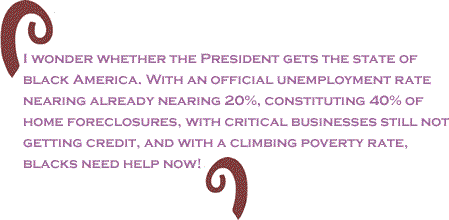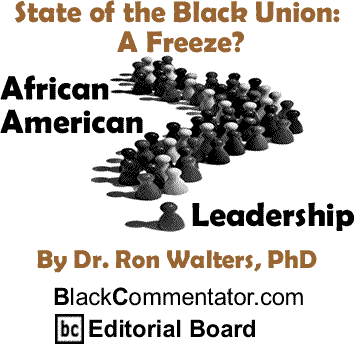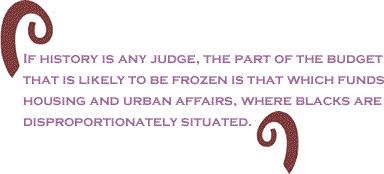
|
||||||||||||||||||||||
|
||||
 |
||||
| In President Barack Obama�s State of the Union address he did, as expected, pivot sharply toward addressing the economy in a pointed, feisty, significant display of pushback to critics and the Republican establishment that his programs have not worked.� But two things worry me about his strategy where the state of black America is concerned.� First, with respect to jobs he announced a series of things that would help small businesses: giving $30 billion to community banks to fund projects, eliminating their capital gains tax, providing $5,000 tax credit for each person hired, and tax incentives for investment in plant and equipment.�
Everyone is having a difficult time resume` shopping with businesses small and large not hiring.� But even if the President�s strategy works, history tells us that blacks will be the last hired which is why they may not recover their pre-recession position in the labor force.� This was the story of the Bush recession of 2001 and its aftermath.� So, I conclude with Nobel Prize winning economist Paul Krugman that against this backdrop something much larger is needed than this relatively modest, almost Republican sounding set of measures.
Something I have said before bears repeating, which is that the Economic Policy Institute projects that by the end of this year, if the unemployment rate continues to climb, the poverty rate for black children, now at 30%, could reach 50%.� That prospect alone calls for a toughness by black leaders in the face of a possible freeze on governmental assistance.� Bob Herbert also points this out in a recent New York Times column (�Blacks in Retreat�) and, observing the extent to which blacks and other communities of color are being crushed� by this recession, says that, �decades ago you would have heard a sustained outcry against such dire conditions amongst blacks and there would have been loud demands for policy changes designed to bring more black Americans into the economic mainstream.�� His conclusion as to why things have been so quiet is that, �too many so-called black leaders are more interested in invitations to the White House�than in raising the kind of ruckus that might benefit people in real trouble.�
Is Herbert right?� There is something to what he says, but whether or not he is right, it appears that black leadership must step up.� At least one-quarter of the Stimulus funds have been spent and the black unemployment rate is still growing, now the timetable faced by the black community is defined by the prospect of a Budget freeze which may close off the opportunity for a direct spending impact on black economic fortunes, especially for the needy.� The leadership situation grows even more urgent as President Obama has said that he is not an ideologue, but essentially a pragmatist. This may be why he continues to attempt to appeal to Republicans to affect bi-partisanship, exhibiting a pragmatism that could result in handing over control of governance to the minority party.� The only thing that can check this is the rise of an agitated Left, lead by the Black community.� When will its leadership step up to the plate? BlackCommentator.com Editorial Board member, Dr. Ron Walters, is the Distinguished Leadership Scholar, Director of the African American Leadership Center and Professor of Government and Politics at the University of Maryland College Park. His latest book is: The Price of Racial Reconciliation (The Politics of Race and Ethnicity) (University of Michigan Press). Click here to contact Dr. Walters. |
||||
 |
||||
If you would like to comment on this article, please do so below. There is a 400 character limit. You do not need a FaceBook account. Your comment will be posted here on BC instantly. Thanks. Entering your email address is not mandatory. You may also choose to enter only your first name and your location.
|
||||
Thank you very much for your readership. |
||||
| Any BlackCommentator.com article may be re-printed so long as it is re-printed in its entirety and full credit given to the author and www.BlackCommentator.com. If the re-print is on the Internet we additionally request a link back to the original piece on our Website. | ||||
| |
||||
Issue 361 |
| Executive Editor: Bill Fletcher, Jr. |
| Managing Editor: Nancy Littlefield |
| Publisher: Peter Gamble |
| Est. April 5, 2002 |
| Printer Friendly Version in resizeable plain text format |
 |
 |
 |

|
 |
| |
| |











































